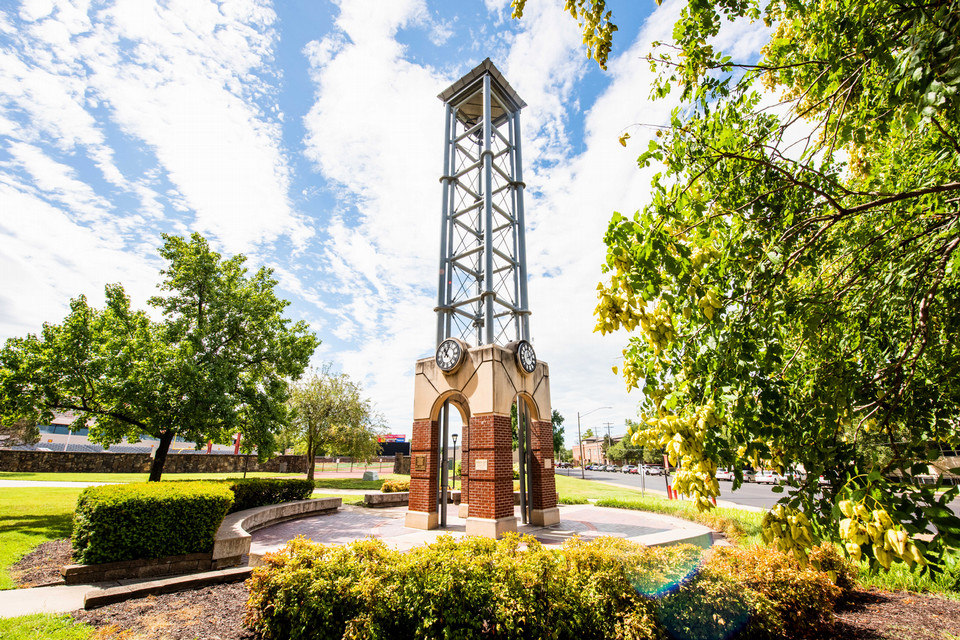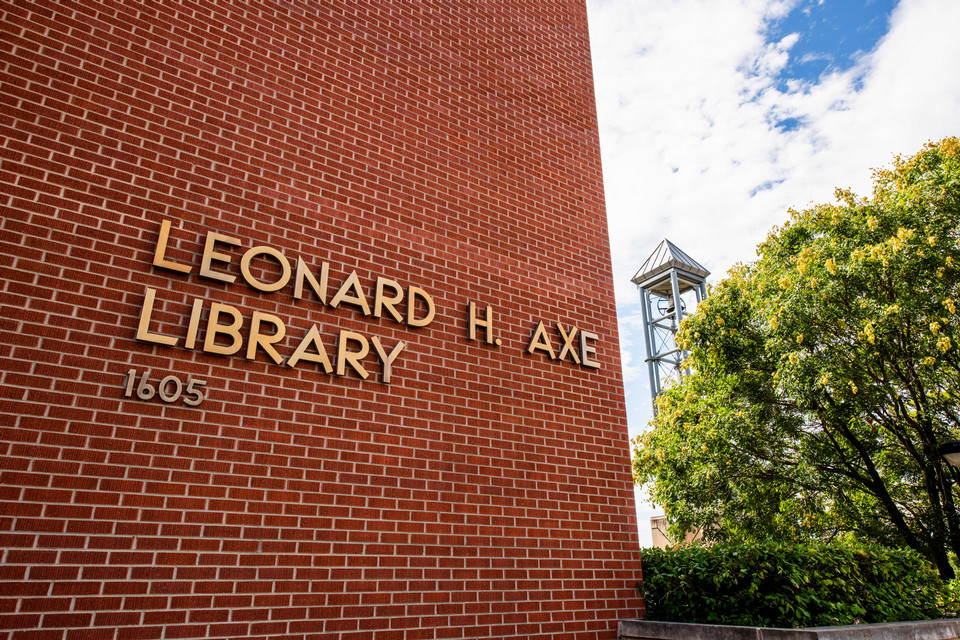Student Disability Services
Making a difference with every interaction!
What We Do
Student Disability Services are provided to currently enrolled PSU students who are substantially impaired during one or more major life activities. Students may qualify for services that accommodate for their impairments and provide equal access to educational opportunities.
Reasonable accommodations depend upon the nature and degree of severity of the documented disability. While the Americans with Disabilities Act of 1990 requires that priority consideration be given to the specific methods requested by the student, it does not imply that a particular accommodation must be granted if it is deemed not reasonable and other suitable techniques are available.
The specific type of service is determined on an individual basis. We match the student with the appropriate service. Reasonable accommodations are typically categorized on the basis of:
- mode of presentation (e.g., note-taker for class lectures, reader for exams)
- mode of expression (e.g., use of a computer for written exams)
- location and setting (e.g., distraction reduced testing location)
- time (e.g., extra time for tests)
Student Disability Services can also provide study skill strategies and direct students to other appropriate university support services.
What the Office Does
- The Coordinator will review all documentation provided and information obtained through the interview process for reasonable accommodations to be determined on an individual basis. (Documentation Policy and Guidelines for Students)
- Student Disability Services staff will email letters of accommodations to your instructors that outline your approved accommodations.
- Student Disability Services will email your letter stating your approved accommodations to your @gus.pittstate.edu email address.
It is important and your responsibility to meet with each of your instructors at the beginning of the semester regarding your accommodations within the class.
How to Get Accommodations?
Incoming PSU Students
- Make an appointment with the Coordinator by stopping by 113 Axe Library or by calling 620-235-6578.
- Complete the Request for Accommodations (Word download) form and submit it to the Coordinator of Student Accommodations, along with your documentation of your disability.
- Look at our Accommodation Registration Agreement (Word download) for more information about Accommodations and what to expect
- Submission Options:
- In-person at Axe Library, Room 113
- Mail to: Student Accommodations Coordinator, PSU Student Success Programs, 1701 South Broadway, Pittsburg, KS 66762
- Fax to: 620-235-6582
- Submission Options:
Continuing Students
- Students who are registered with Student Disability Services will be eligible to receive accommodations until they have graduated, no longer enrolled, or have requested otherwise.
Continuous communication with your instructor regarding your accommodations is important throughout the semester.

Guides to Accommodations
Parents & Family Guide
Attending college is a huge change and adjustment for any individual pursuing a higher education and can be for families too. Many questions and concerns can arise whether a student does or does not have a disability. Provided below is information to help answer questions regarding accommodations in higher education.
Key Things Students Need...
- Develop Self-advocacy skills
- Understand and be able to describe their disability
- Manage Time Wisely- Be able to schedule and keep appointments/Keep a planner
- Work with the Center for Student Accommodations to request and arrange their accommodations
- Communicate with faculty and staff regarding their accommodations
Understanding the Civil Rights Laws
Section 504 of the Rehabilitation Act and the Americans with Disabilities Act prohibit discrimination against persons with disabilities, and mandate accommodations only indirectly. The law considers college students to take charge of their education and be responsible for their success. If a student doesn't request an accommodation, the consequences of that action belong to the student.
Students with disabilities are encouraged to schedule an appointment to speak with the coordinator of the Center for Student Accommodations at Pittsburg State University.
FAQ's about Section 504 and ADA
Eligibility Criteria
A physical or mental impairment which substantially limits one or more major life activities and the impairment need not adversely affect the student's educational performance.
Who is covered?
Protects all persons with a disability from discrimination in educational settings.
Services Provided
Regular education setting with reasonable accommodations.
Evaluation/Documentation
504 are the same for elementary and secondary schools.
COLLEGE - for 504/ADA the students must self-identify as having a disability and must provide adequate documentation of disability:
- Evaluations/documentation of disability are the student's responsibility and
- The student has responsibility for advocacy, negotiating accommodations plan
Funding
No funding provided
Faculty Guide
Student Disability Services ensures all students with disabilities at Pittsburg State University are provided equal access to a quality education. Creating inclusive environments and providing access to all individuals with disabilities may be accomplished through specific accommodations or through the implementation of a universal design for learning. Providing equal access to all individuals at PSU requires the commitment and partnership of faculty, staff, and students.
Faculty Role in Accommodations
When students are registered for accommodations, you will receive an accommodation letter stating the approved accommodations the student receives. You may be asked to:
- Assist the student in finding effective peer note-takers from the class. Alternatively, you could provide the student with a copy of your lecture notes or outline.
- Allow the student to record lectures.
- Allow the student extended time on exams.
- Allow the student to take the exam in a distraction reduced location.
- Allow the student to use a calculator for exams.
If you have questions or concerns regarding a student's accommodations stated on their letter, please talk with the student or contact the Coordinator of Student Accommodations.
Procedures for Testing Accommodations
- Discuss accommodations stated on the accommodation letter with the student
- Complete and return the Exam Request Form to the student upon receiving one to fill out. Keep a copy for your records.
- At least 24 hours prior to the scheduled exam time, send exams via email to disabilityservices@pittstate.edu or hand deliver the exams to Student Accommodations in 113 AXE Library.
Disability Law Definitions and Information
Section 504 of the Rehabilitation Act and American with Disabilities Act, including its many amendments prohibits discrimination against otherwise qualified students with disabilities.
- Discrimination means excluding a student with a disability from any University course, program, service or employment because of the student's disability.
- Qualified means that the student has met the admission requirements of the University with or without accommodations. Students with disabilities must meet all relevant academic and conduct standards at Pittsburg State University, just as other students, to remain qualified.
- Accommodations provide equal access to students with disabilities to the facilities, activities and academics on Pittsburg State University's campus who are registered with our office.
- A Reasonable accommodation does not fundamentally alter a course or reduce the academic standards of a course or program.
- If you think an accommodation suggested by Student Accommodations will fundamentally alter your course please let us know immediately.
Universal Design for Learning (UDL)
Universal Design for Learning reduces barriers within instruction and provides flexibility in ways class material is presented and how students respond and demonstrate knowledge. UDL gives all individuals equal opportunities to learn.
In order to create universally accessible courses, colleges must take the following steps to ensure their classes and campuses are completely inclusive:
- Allow students with special needs to complete coursework, give presentations, and take exams using alternative formats.
- Work with students with specific needs to gain access to adaptive software and technology that helps them learn effectively.
- Appoint individuals who can assist these students as note-takers, readers, scribes, or other essential roles.
- Offer students with special needs additional time for assignments and tests, as well as getting to class.
- Guide students with disabilities to specialized counselors, resource centers, and other on-campus services dedicated to assisting these individuals.
Other resources:
Learning Disabilities
A specific learning disability as "a disorder in one or more of the basic psychological processes involved in understanding or in using language, spoken or written, that may manifest itself in the imperfect ability to listen, think, speak, read, write, spell, or to do mathematical calculations." This disability category includes such conditions as perceptual disabilities, brain injury, minimal brain dysfunction, dyslexia and developmental aphasia (a type of language disorder).
Specific Learning Disabilities (SLD) is by far the largest category of disability within the Individuals for Disabilities Education Act.
Specific learning disabilities commonly affect skills in the areas of:
- Reading (called dyslexia)
- Writing (called dysgraphia)
- Listening
- Speaking
- Reasoning
- Math (called dyscalculia)
Specific learning disabilities include:
- Difficulty reading out loud
- Poor reading comprehension
- Struggling to write papers and essays
- Trouble understanding lectures
- Difficulty holding a pencil
Psychiatric Disabilities
"Mental Illness" is a medical condition that disrupts a person's thinking, feeling, relating and daily functioning. It often results in a diminished capacity for coping with the demands of life. A mental illness is rarely apparent to others. However, students may experience symptoms that interfere with their educational goals and that create a "psychiatric disability."
The following are some of the psychiatric diagnoses:
- Bipolar Disorder
- Obsessive Compulsive Disorder (OCD)
- Generalized Anxiety Disorder
- Post-Traumatic Stress Disorder (PTSD)
- Dissociative Identity Disorder
- Autism Spectrum Disorder
- Depression
- Eating Disorder
- ADHD
National Institute of Mental Health (NIMH)
Children and Adults with Attention-Deficit/Hyperactivity Disorder (CHADD)
Tips for Academic Success

- Be able to describe the nature of your disability and areas of difficulty.
- Contact the Student Disability Services team at the beginning of each semester to make arrangements for accommodations. Student Disability Services nor instructors are obligated to provide accommodations retroactively.
- Talk to your instructors about your learning or physical limitations.
- Set realistic goals and priorities for coursework. Choose courses carefully, especially your first year.
- Manage time well. Keep a daily planner with all assignments, appointments, and test dates.
- Sit toward the front of the classroom to maximize learning and reduce distractions.
- Plan on studying 2 hours outside of class for every hour spent in class.
- If you are having trouble, seek support services early in the semester from your instructor or Student Disability Services staff.
More Information
About the Coordinator
The Coordinator for Student Disability Services assists students who have or think they may have a disability. The Coordinator works with faculty and staff to ensure reasonable accommodations are in place for students registered with the office. Each semester the Coordinator reviews, prepares, and sends letters of accommodation to faculty and staff. When students have testing accommodations, the Coordinator communicates with instructors to assist in the proctoring of exams.
Confidentiality
Student Disability Services is committed to ensuring that confidentiality is protected. Staff will not disclose your relationship with our office or information contained in your student-client file that is considered part of your educational record and is protected from disclosure under the Family Education Rights and Privacy Act (FERPA). Your disability-related information which includes documentation, correspondence, file notes, and accommodation records is considered part of your educational record and will not be disclosed without your written consent. Access to disability-related information is shared only on a need-to-know basis and to ensure appropriate access to education and facilities.
Our Community.